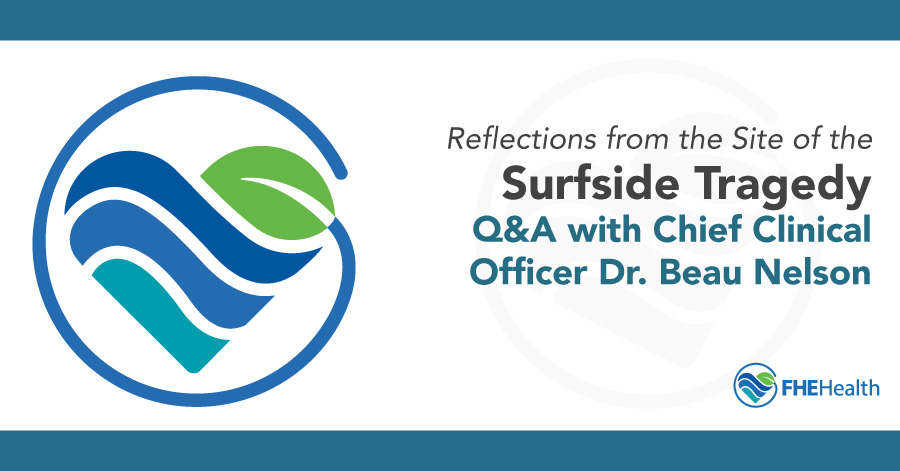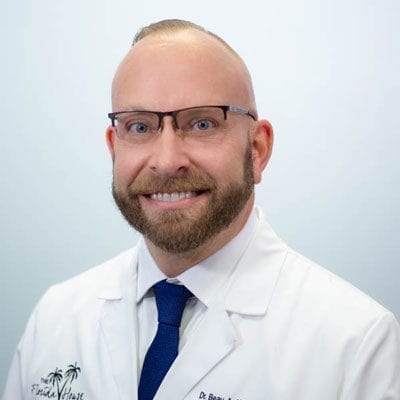

Updated July 1, 2022
Friday, June 24, marked the one-year anniversary of the Surfside tragedy that claimed the lives of 98 people. When the tower fell, the town reached out to FHE Health for help counseling city employees who were part of the rescue effort and the difficult days following the tragedy. Dr. Beau Nelson, Chief Clinical Officer, was on-site working with the town to provide counseling and support and to do a critical incident debriefing for staff.
Exactly one year later, the town of Surfside, Florida, held an event to commemorate the lives lost in the 2021 tower collapse. At the request of the town, FHE Health was present again to provide comfort and support as a trusted friend to town employees. Hurt and Bev Perez, a peer support and interventionist in “Shatterproof FHE Health’s” treatment program for first responders, were there to provide support during this time of grieving and reflection.“FHE Health cares about our community,” Dr. Nelson said. “When tragedy strikes or our neighbors are in need, we are there to assist and stand ready to provide help and healing wherever we can.”
In the more immediate aftermath of the Surfside collapse, we featured the below article with Dr. Nelson, who at that time shared some moving reflections about what it was like to be on the scene providing a supportive presence….
Responding to Surfside and Being There in a Moment of Crisis
When a 12-story condo building collapsed last month in the small community of Surfside, Florida, people from many walks of life showed up at the site where at least 98 lives were unaccounted for. Families, neighbors, first responders and therapists came together to grieve, console one another, provide counseling and support, and work round the clock to dig through the rubble for signs of life and an accurate death count.
FHE Health’s Chief Clinical Officer Dr. Beau Nelson was one of those who was there to provide mental health support and counseling to those on the frontlines of the rescue response. In this brief Q&A, he shared a bit about what that was like, as well as some tips and observations for those who may have been closely impacted by this trauma.
What were you doing to provide assistance at the site of the Surfside condo collapse?
I was doing something known as “critical incident stress debriefing.” It’s a psychological tool for helping people in a crisis facing tragedies like this one. It gives them the opportunity to get support, understand what they’re going through, and frame it, and put it in perspective.
I was doing these debriefings with employees of the town of Surfside. They had been dealing with so much: the sense of loss, the distress, the shock of having a tragedy like this one happen in their neighborhood, and then the disruptions to their schedules. Many of them had been working night and day in a race against time to find survivors while being available to scared and grieving families.
What did you learn from the experience?
It reminded me of the resiliency and the good in people. It revealed a tight-knit community of people who care about one other and showed me once again how going through a tragedy like this together offers a great deal of support. You see the connections between people and how they’re able to support each other and what’s good and loving and caring in our world.
What kinds of mental health concerns do you commonly see after a tragedy like this?
It can be very individual. Some folks might have sadness and feel overwhelmed, or they may have physical symptoms like headaches, not sleeping well, changes in mood. Some people may experience over-stimulation that leads to retreat, isolation and shutting down.
There are stages for most people. Not everyone develops PTSD or is completely incapacitated; some people might not feel anything, and for other folks it’s really emotional at first and then it comes back later. There can be a whole variety of symptoms that someone might have. It has a lot to do with personality and their life experiences and a variety of things.
How do you know if it’s time to seek help for your symptoms?
You’re going to have your emotional and physical reactions to an event, and for most folks these tend to recede over time. If you notice that rather than going away, these reactions become more intense, and you can’t seem to get past it—that’s a good time to reach out to a professional to get support and assistance.
If people want to get involved in helping victims of the Surfside tragedy, what would you recommend?
You can go to this link, where you can find some resources and information about how to support and help victims of the tragedy.
Another great way to get involved: Sign up for the Support Surfside 5K on July 31, which FHE Health is helping to sponsor.
You can also make a donation to show your support of #surfsidestrong. 100 percent of all proceeds and donations will go to: https://supportsurfside.org.






